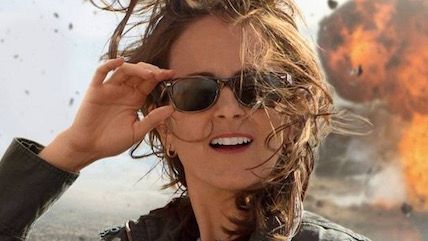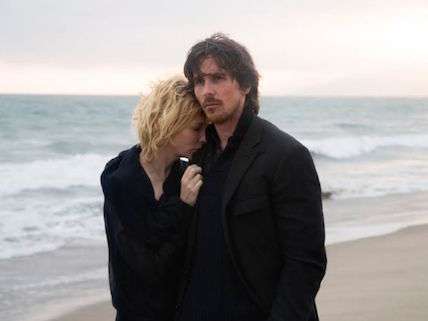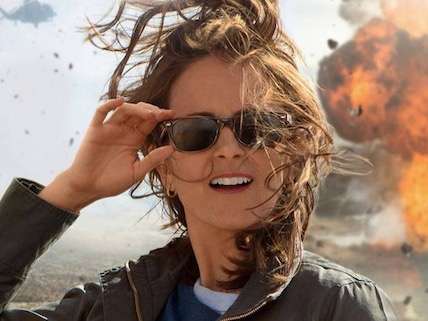Movie Reviews: Knight of Cups and Whiskey Tango Foxtrot
Terrence Malick and Tina Fey in search of things unfound.


Surely Terrence Malick, the writer and director of Knight of Cups, knows what this movie is all about. If only he would let us in on it. Since the picture was shot without a script, or even scene-blocking for camera placement, you wonder how much of a clue the actors themselves had. Malick has made some wonderful films over the 43 years since he debuted with Badlands; but this one, like his last one, To the Wonder, isn't one of them.
Christian Bale stars as an in-demand Hollywood screenwriter named Rick. Despite his success—his seaside condo, his sleek Armani suits, his frequent cavortings with minimally clad young women—Rick is miserable. Given very little to say, he wanders wordlessly around Los Angeles, along melancholy beaches and through empty studio back lots, occasionally murmuring to himself in voiceover. "Where did I go wrong?" he wonders.
The movie echoes the 1960s golden age of cinematic inscrutability. Tracking shots through a silent neo-rococo mansion recall Last Year at Marienbad. The depiction of the rich and famous leading lives of glittering emptiness would draw an approving nod from Antonioni. And a tilt-up shot of a helicopter flying overhead might be a hat tip to Fellini—who certainly would have had a livelier take on all of this. The story, such as it is, is keyed to John Bunyan's The Pilgrim's Progress and to the cards of the tarot (the Knight of Cups being one of them). Serious intent is also projected by Hanan Townshend's beautiful score, and by swatches of Grieg and Corelli and—inevitably, perhaps—Arvo Pärt's Miserere.
Rick is haunted by the long-ago death of a brother (a biographical detail from Malick's own life). He has a tense relationship with his other brother, a screw-up named Barry (Wes Bentley), and still can't connect with his cantankerous father (Brian Dennehy). He also has an ex-wife (Cate Blanchett), who sympathizes with him but won't be coming back to him any time soon. He seeks solace in the arms of other women, among them a pink-wigged punkette (Imogen Poots), a sweet fashion model (Freida Pinto), and—in flashback—a straying wife named Elizabeth (Natalie Portman), whom he alienated by getting her pregnant. He picks up a stripper (Isabel Lucas) and takes her to Las Vegas for some familiar nightclub debauchery. His pilgrimage toward redemption progresses very slowly, and we wonder if Rick will ever get where he's supposed to be going. (The movie is only two hours long, but it feels interminable.)
Malick is known to shoot miles of footage for later assembly in the edit. This explains some of the out-of-nowhere shots here: a closeup of a nude woman on a balcony, talking on a phone; Rick's brother suddenly attacking a table with a machete; a meditation on a crippled pelican. The striking cinematography is by Emmanuel Lubezki, but the actors were sometimes handed little GoPro cameras to capture additional perspectives. So when Rick attends a lawn party at a vast estate, Malick is able to push us into a jostling crowd of random celebrities: Antonio Banderas, Joe Manganiello, Joel Kinnaman, Ryan O'Neal, and other notable faces who evidently had an afternoon free. They seem to be having a good time, and as soulless as their revels may be, we wish we could join them.

Whiskey Tango Foxtrot
There was never a lot to laugh about in connection with America's Middle East incursions, and on the evidence of Whiskey Tango Foxtrot, there still isn't. The movie attempts what may be the impossible: grafting a romantic comedy onto a battle-action story set in Afghanistan in the mid-2000s, with go-girl uplift and some awkward cultural observations lashed on for bad measure. If anyone could make this work, you might think it would be Tina Fey. Sadly, though—after all, who doesn't love Tina Fey?—you'd be wrong.
The movie is adapted from a book by former Chicago Tribune war correspondent Kim Barker, who offered a wry take on her wartime experiences in Afghanistan. The script is by Robert Carlock, Fey's collaborator on Unbreakable Kimmy Schmidt and 30 Rock; and directors Glenn Ficarra and John Requa have a resume that includes the memorably funny Crazy, Stupid, Love. But none of these talented people were able to bind the story's ungainly elements together, and it's unlikely anyone else could've either.
Fey's character here is named Kim Baker (a pointless adjustment of Barker's surname), and she's been upgraded from print journalist to news writer for a New York-based cable news network. Her life in Manhattan is a dreary cliché: she's over 40, she's still unmarried, and her boyfriend (Josh Charles) is a secret weasel. When she's offered a slot as a producer for the network's Afghanistan coverage, she leaps at the opportunity—and soon we get to marvel at what a clueless civilian she is. She arrives in-country bareheaded ("Shameless whore!" a Muslim woman shouts at her) and has made no effort to learn even a few words of the local language. Out on patrol with the Marine unit in which she's been embedded, she forces the convoy to a halt so she can scramble off to pee in a bush. Women.
Kim shapes up somewhat under the tutelage of another correspondent, Tanya Vanderpoel (Margot Robbie), who informs her that sex is the main non-combat activity among her fellow journos, and says, "In Afghanistan, you're a serious piece of ass." The local Marine commander, General Hollanek (Billy Bob Thornton), more or less agrees: back in the States, he tells Kim, she might be a four; here, though, she's a 10. Kim's not sure how to take this.
In the course of producing battlefield reports for a network that doesn't care (all the newsworthy action has shifted to Iraq), Kim bonds with her local interpreter, the solicitous Fahim (Christopher Abbott, in a performance of captivating warmth); fends off the oily politician Sadiq (Alfred Molina), who wants to make her his "special friend"; and finally falls into bed with a diamond-in-the-rough Scottish news photographer named Iain (Martin Freeman). Abbott and Molina aren't Afghans, and I know some reviewers have found this irksome. They both bring something specific to the picture, though. And Freeman isn't Scottish, either, so… whatever.
Fey handles the funny stuff with her usual aplomb, but there aren't enough good laughs, possibly because the combat fireworks and the occasional shot of something like a bloody severed limb sour the context. And one promising scene—Kim's meeting with a group of burqa-clad tribal women—is oddly truncated: the camera cuts away before we see what's happening, and Kim just tells us about it afterward instead. There's also a key betrayal that needed more careful narrative preparation—its specifics are frustratingly unclear.
One day Tina Fey will find (or write) a movie script that will be worthy of her comic talent and at the same time allow her room to pursue more ambitious avenues of expression. It looks like that day is still to come, though.


Show Comments (33)